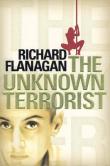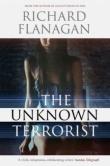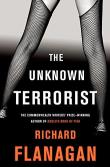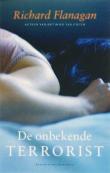AustLit
Latest Issues
AbstractHistoryArchive Description
'Gina Davies, aka The Doll, is a 26-year-old pole dancer at the Chairman's Lounge in Sydney's Kings Cross. She's a flawed woman, racist, obsessed with money, who finds her life suddenly being destroyed by the things she has up until that moment most firmly believed in. The evening of the Mardi Gras, 2007. Three unexploded bombs have been found that day at Homebush Stadium, so the country is on high-alert. When wandering through the Mardi Gras' crowds the Doll runs into a good-looking, young dark man. They end up at his place. When she wakes, it's Sunday morning and he has gone. She is getting a coffee in a café opposite the apartment block she spent the night in when she sees armed police surround the building she has just left. Later in the day while shopping in the city she sees a story on a big video screen in which the news is of a suspected terrorist entering the same building she had spent the night in. That night, on television news, the story has altered a little. In an exclusive, the network has security camera footage of the terrorist entering the building the night before with an accomplice, a woman she recognises as herself. And so a case is brought against her by the media, and the hunt for her begins. From a 26-year-old pole dancer in the Chairman's Lounge, she quickly becomes the most wanted woman in Australia as every truth of her life is turned into a lie...' (Publisher's blurb)
Notes
-
Dedication: For David Hicks.
-
Brief mention under editors' choice column, The New York Times Book Review 29 July 2007, p.18.
Publication Details of Only Known VersionEarliest 2 Known Versions of
Other Formats
- Sound recording.
- Large print.
Works about this Work
-
Looking behind Grand Façades : The Ambiguous Visibility of Urban Wealth in The Unknown Terrorist, Saturday, and The White Tiger
2021
single work
criticism
— Appears in: Ariel : A Review of International English Literature , July-October vol. 52 no. 3/4 2021; (p. 117-139)'Scholarship on literary renderings of the urban has focussed primarily on poverty and thus contributed to a somewhat one-sided perception of social inequalities. For the sake of a more comprehensive perception of the social asymmetries shaping today's cities, this essay focuses on urban wealth and explores its centrality to three neoliberal city-novels written in the first decade of this century: Ian McEwan's Saturday (2005), Richard Flanagan's The Unknown Terrorist (2006), and Aravind Adiga's The White Tiger (2008). To explore how these three otherwise quite dissimilar texts represent the perceived "fantastic conspicuousness of consumption and affluence" (Baudrillard 25) in modern cities, the essay considers voices in urban studies critiquing the once optimistic understanding of cities as "wealth machines" (Molotch) and draws on Andrea Brighenti's theoretical deconstruction of the popular equation of visibility with power and invisibility with powerlessness. Conspicuousness, it submits, is only one side of urban wealth; another is, as the three novels under study show, the typical intangibility of capital power, enforced by an intricate interplay of exposure and concealment of urban wealth and itself enforcing social divides in cities.' (Publication abstract)
-
Sydney, a City without Love: The Unknown Terrorist in 'The Unknown Terrorist'
2018
single work
criticism
— Appears in: Richard Flanagan : Critical Essays 2018; (p. 169-177) -
Terror, Paranoia and Manipulation: The Politics of Fear in 'The Unknown Terrorist'
2018
single work
criticism
— Appears in: Richard Flanagan : Critical Essays 2018; (p. 155-167) -
"And Then I Smiled" : Recent Postcolonial Fiction and the War on Terror
2016
single work
criticism
— Appears in: Le Simplegadi , April no. 15 2016; (p. 16-23) The aim of this essay is to compare the reactions to the 2001 attack to the Twin Towers as they are related and reflected upon in Western and non-Western fiction. We start from the analysis of a novel by a Pakistani author, Mohsin Hamid, The Reluctant Fundamentalist. Then, we compare the genesis of a terrorist, as it is depicted by the American author John Updike in Terrorist, and the creation of a terrorist by the media, which is the main subject of The Unknown Terrorist by the Australian 2014 Man Booker Prize Winner Richard Flanagan. -
The Post-Sovereign Novel : Biopolitical Immunities in Manfred Jurgensen’s The American Brother
2016
single work
criticism
— Appears in: Australian Literary Studies , 10 August vol. 31 no. 4 2016; 'The Australian government’s responses to the September 11 attacks introduced a new theme into Australian literature. Novels such as Andrew McGahan’s Underground and Richard Flanagan’s The Unknown Terrorist sought to address, in narrative form, threats to the rule of law that arose from a rapidly emerging Western security state. Drawing on the political and juridical framework of liberalism, these novels attacked an Australian political and social milieu that justified the expansion of sovereign power. This essay argues that the liberal framework informing these novels misrecognises the structure of power post-9/11: insofar as it posits an absolute dichotomy between law and sovereignty, the language of liberalism prevents us from thinking right and power concomitantly. This essay reads Manfred Jurgensen’s novel The American Brother through the political philosophy of Roberto Esposito. In doing so, it suggests that a biopolitical account of the post-9/11 security state, in the form of Esposito’s paradigm of immunisation, enables not only a coherent epistemology of contemporary sovereign power, but also opens up a critical approach to literature that thinks outside the limitations of liberal discourse.' (Publication abstract)
-
Apocalypse Now as Darkness Descends
2006
single work
review
— Appears in: The Canberra Times , 28 October 2006; (p. 11)
— Review of The Unknown Terrorist 2006 single work novel -
The Terrorist Stripped Bare
2006
single work
review
— Appears in: The Sydney Morning Herald , 28-29 October 2006; (p. 32-33)
— Review of The Unknown Terrorist 2006 single work novel -
Untitled
2006
single work
review
— Appears in: Bookseller + Publisher Magazine , October vol. 86 no. 4 2006; (p. 29)
— Review of The Unknown Terrorist 2006 single work novel -
A Dance to the Music of the Times
2006
single work
review
— Appears in: The Age , 4 November 2006; (p. 27)
— Review of The Unknown Terrorist 2006 single work novel -
Plea from the Heart
2006
single work
review
— Appears in: The Advertiser , 4 November 2006; (p. 12)
— Review of The Unknown Terrorist 2006 single work novel -
Uneasy Writer
2006
single work
biography
— Appears in: Good Weekend , 21 October 2006; (p. 73, 75-76) -
Undercover
2006
single work
column
— Appears in: The Sydney Morning Herald , 21-22 October 2006; (p. 30) A column canvassing current literary news including reactions to Richard Flanagan's latest novel The Unknown Terrorist. -
In Flanagan's Wake
Tony O'Loughlin
(interviewer),
2006
single work
interview
— Appears in: Bookseller + Publisher Magazine , October vol. 86 no. 4 2006; (p. 44) -
Worst-Case Enthusiasts
2006
single work
column
— Appears in: The Weekend Australian , 25-26 November 2006; (p. 40) Imre Salusinszky reflects on recent films and books that feature 'apocalyptic imaginings'. 'That apocalypse and looming disaster should form an important theme of the arts at a time like this is no surprise. But when we look at the contemporary arts and ask what is identified as the source of the disater, one extremely plausible villain, Islamofascism, is nowhere to be found.' Salusinszky illustrates his thoughts with reference, among other works, to Andrew McGahan's Underground and Richard Flanagan's The Unknown Terrorist. -
When Big Brother is Just a State of Mind
2007
single work
essay
— Appears in: The Australian Literary Review , February vol. 2 no. 1 2007; (p. 6-7)Ungerer and Martin Jones create a fictitious student roaming the bookstores of Australia's universities. Their student gains impressions of the portrayal of government policy relating to terrorism via readings of fiction and non-fiction works.
The authors decide that the student might conclude 'that either the literary and academic world inhabited a paranoid delusion or that the fascist Australian state was incompetent. For despite the apparently totalitarian controls of the anti-terror laws, government, police, bureaucracy and media all seem to tolerate, and even encourage with generous funding grants, the academic and literary exposure of their authoritarian ambitions.'
Awards
- 2008 longlisted International IMPAC Dublin Literary Award
- 2007 shortlisted Australian Booksellers Association Awards — BookPeople Book of the Year
- 2007 shortlisted Ned Kelly Awards for Crime Writing — Best Novel
- 2007 longlisted Miles Franklin Literary Award
- Kings Cross, Kings Cross area, Inner Sydney, Sydney, New South Wales,
- 2007









